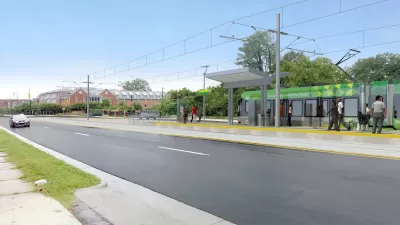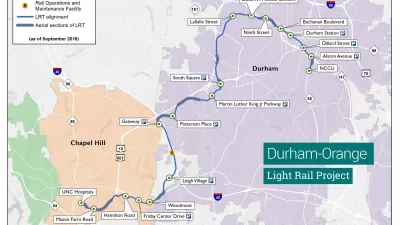A 37-mile commuter rail line under study in North Carolina could connect cities Raleigh, Cary, and Durham in North Carolina, but the system will cost a pretty penny, and it will have to succeed where light rail previously failed.

Richard Stradling reports: "A commuter rail system running 40 trains each weekday between Garner and Durham would cost $1.4 billion to $1.8 billion to build and carry 7,500 to 10,000 passengers a day, according to preliminary estimates from the regional transit agency GoTriangle."
According to the feasibility study released by GoTriangle last week, the 37-mile route studied by GoTriangle would require 34 miles of new tracks to connect Raleigh, Cary, and Durham. Another three miles would use an existing corridor currently owned by the N.C. Railroad.
"The feasibility study from GoTriangle provides the most refined details to date about the commuter rail system proposed by transit plans in both Durham and Wake counties," according to Stradling.
Casting a shadow over the potential of the project to win the financial and political support necessary to succeed is the recent—March 2019—demise of the Durham-Orange Light Rail project.
FULL STORY: Commuter rail in Wake and Durham counties would cost up to $1.8 billion, study says

Maui's Vacation Rental Debate Turns Ugly
Verbal attacks, misinformation campaigns and fistfights plague a high-stakes debate to convert thousands of vacation rentals into long-term housing.

Planetizen Federal Action Tracker
A weekly monitor of how Trump’s orders and actions are impacting planners and planning in America.

San Francisco Suspends Traffic Calming Amidst Record Deaths
Citing “a challenging fiscal landscape,” the city will cease the program on the heels of 42 traffic deaths, including 24 pedestrians.

Defunct Pittsburgh Power Plant to Become Residential Tower
A decommissioned steam heat plant will be redeveloped into almost 100 affordable housing units.

Trump Prompts Restructuring of Transportation Research Board in “Unprecedented Overreach”
The TRB has eliminated more than half of its committees including those focused on climate, equity, and cities.

Amtrak Rolls Out New Orleans to Alabama “Mardi Gras” Train
The new service will operate morning and evening departures between Mobile and New Orleans.
Urban Design for Planners 1: Software Tools
This six-course series explores essential urban design concepts using open source software and equips planners with the tools they need to participate fully in the urban design process.
Planning for Universal Design
Learn the tools for implementing Universal Design in planning regulations.
Heyer Gruel & Associates PA
JM Goldson LLC
Custer County Colorado
City of Camden Redevelopment Agency
City of Astoria
Transportation Research & Education Center (TREC) at Portland State University
Jefferson Parish Government
Camden Redevelopment Agency
City of Claremont





























